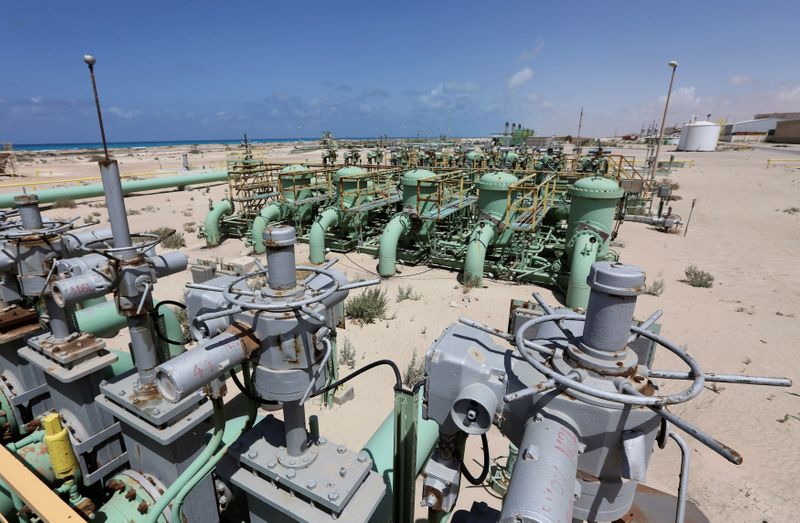CAIRO (Reuters) - A blockade on Libya's oil facilities has been partially lifted, allowing a gradual reopening of some ports and fields, but obstacles and uncertainties complicate a full recovery.
WHY WAS LIBYA'S OIL BLOCKADED?
The blockade on most of Libya's oilfields and ports was imposed in January by Khalifa Haftar's eastern-based Libyan National Army (LNA) and its allies.
The LNA was waging an offensive to take control of the capital, Tripoli, and said it wanted to stop misuse of revenue by armed factions that control the capital along with the Turkish-backed Government of National Accord (GNA).
It also drew on longstanding claims that Libya's east - home to much of the country's reserves - has not received its fair share of oil receipts.
Oil revenue has always been processed through the central bank in Tripoli, which pays public salaries across the country.
Factions that moved to eastern Libya in 2014 as part of a broader conflict have repeatedly tried and failed to sell oil independently.
The blockade was seen as a key bargaining chip for Haftar and his foreign backers, which include the United Arab Emirates, Egypt and Russia.
WHY HAVE PORTS AND FIELDS REOPENED?
The LNA's offensive on Tripoli collapsed in early June. It retreated eastwards but held on to Sirte, a gateway to Libya's Oil Crescent and its four oil ports.
On Sept. 18 Haftar announced that the blockade would be lifted after the LNA struck a surprise deal brokered with the GNA's Deputy Prime Minister Ahmed Maiteeg.
That followed increased lobbying from the United States and appeals from the U.N. mission as the economic impact of the blockade deepened and port closures caused worsening blackouts in eastern Libya.
Statements from both sides suggested that a joint committee would negotiate how to use the oil revenue after the restart.
HOW SUSTAINABLE IS THE RESTART?
The National Oil Corporation (NOC) has said it will restart facilities only where there is no armed presence.
For years the NOC has sought to neutralise a threat from local factions and the Petroleum Facilities Guard - a force that is meant to protect oil assets but also includes armed groups that have fickle loyalties and have blockaded facilities on occasions to press political demands.
The requirement for demilitarisation is complicated by a military build-up during and after the LNA's Tripoli campaign, involving forces from both sides as well as foreign fighters and mercenaries from countries including Russia, Syria and Sudan.
The restart remains politically fragile because of fears in western Libya that the LNA could gain direct control over oil revenue, potentially using it to clear debt and pay fighters hired since 2014.
For now, money is being held in the NOC's account at the Libyan Foreign Bank, pending political negotiations over a unity government and key institutions such as the central bank, diplomats and analysts say.
But that task has eluded U.N.-led mediators for the past six years. In the meantime, some foreign states have tried to sideline Haftar, but he remains the key power broker in the east and has said the blockade would be lifted initially for one month only.
WHAT IS LIBYA'S PRODUCTION POTENTIAL?
The NOC said its initial target for the restart was 260,000 barrels per day (bpd), up from fewer than 100,000 bpd but a fraction of the more than 1 million bpd produced before the blockade.
Prior to Libya's 2011 uprising and the turmoil that followed it was pumping 1.6 million bpd.
The NOC had ambitious plans to raise that to more than 2 million bpd, but years of conflict and blockades have cut off investment and left infrastructure degraded.
WHO ARE THE MAJOR PLAYERS?
The state-run, Tripoli-based NOC controls all production and exports.
It operates joint ventures with international partners including Eni (MI:ENI), Total (PA:TOTF), Repsol (MC:REP), OMV (VI:OMVV), Equinor (OL:EQNR), Hess Corp (N:HES), ConocoPhillips (N:COP) and Wintershall.
